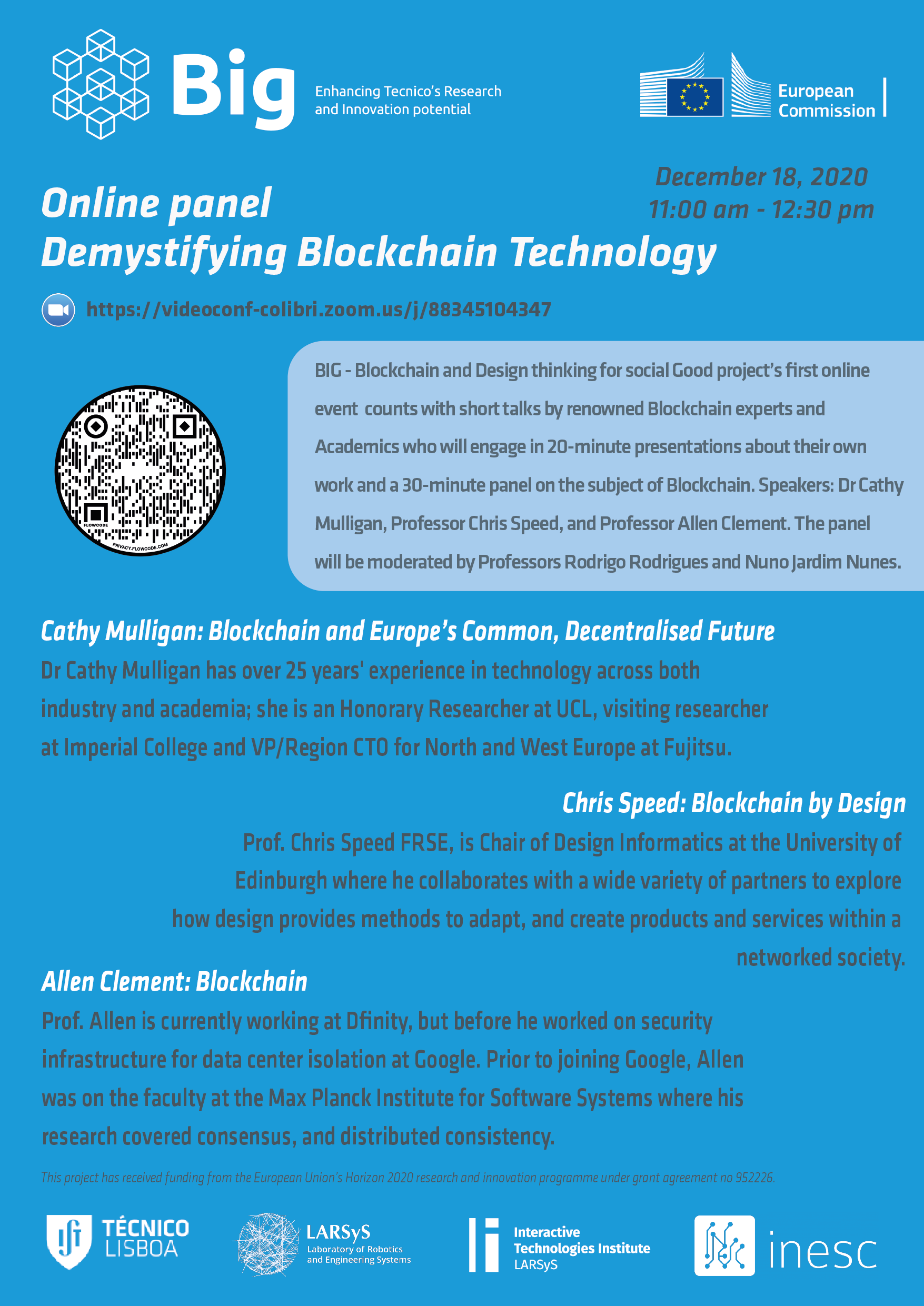ITI / LARSyS and INESC-ID are promoting an online panel this Friday from 11:00 to 12:30 (https://videoconf-colibri.zoom.us/j/88345104347) on Demystifying Blockchain Technology. The panel will include three short talks by the speakers followed by an open discussion.
The Panel will include three International speakers with experience in BlockChain technologies:
- Cathy Mulligan, UCL and Imperial College London
- Chris Speed, Institute for Design Informatics, University of Edinburgh
- Allen Clement, DFINITY
Dr. Catherine Mulligan: Blockchain and Europe’s Common, Decentralised Future
Abstract: Since the dawn of the computing era, we have experienced fluctuations between centralised and decentralised computation – firstly with mainframes, then with PCs through to cloud computing and finally to smart phones and IoT devices. For the vast majority of computing’s life, computational capacity has been located within the realms of the corporate sphere – hidden behind large capital investments and firewalls. As of 2004, however, two separate but deeply intertwined things occurred – firstly, the world saw the emergence of true Open APIs – APIs that permitted anyone with an internet connection to access data (e.g. on Facebook, or Twitter) and secondly, the same amount of computing power that took mankind to the moon was placed into the hands of end-users, not just companies. The end result of those two things was blockchain – a new form of decentralisation that challenges not just our notions of centralised / decentralised computing – but the very foundations of our economy itself. Whole new forms of business models are enabled by Blockchain – from decentralised data marketplaces to decentralised food production. Indeed, as the next wave of decentralisation descends upon us – in the form of AI on the Edge and AI on the device, blockchain will play a critical role in the emergence of a new European economy – a truly digital economy. More importantly, blockchain can help us build a European economy that is environmentally, economically and socially sustainable. This talk will outline the interdisciplinary path that Europe needs to follow in order to achieve this as our world comes to terms with its past and faces its uncertain future – together but decentralised.
Bio: Dr Cathy Mulligan has over 25 years’ experience in technology across both industry & academia; she is an Honorary Researcher at UCL, visiting researcher at Imperial College & VP/Region CTO for North & West Europe at Fujitsu. Prior to joining Fujitsu, she co-founded and was Co-Director of the Imperial College Centre for Cryptocurrency Research and Engineering at Imperial College, where she helped develop over 45 proofs of concept around Blockchain. Also while at Imperial College, she led over £6 million of interdisciplinary grants in the Digital Economy and had a joint appointment between the business school and the Computer Science. Within her work at UCL, Cathy leads the work around “DataNet” – a blockchain-based infrastructure designed to rebalance and redistribute the geo-political balance of technology across the world. She has a strong interest & track record in using research to influence policy in different arenas, including high-level policy discussions at various levels across governments, NGOs, UN, OECD & EU around various digital technologies including 5G, blockchain & IoT. She is the author of 7 technology books (academic press). She is a member of the World Economic Forum’s Data Policy Global Future Council and was a founding member of the World Economic Forum’s Blockchain Council and has authored several reports with them. Cathy has a strong commitment to sustainability and equitable access to technology, evidenced by her being a panel member of the UNSG’s High Level Panel on Digital Cooperation. She received her Masters and PhD from the University of Cambridge and her BSc (Hons 1) from UNSW, Australia.

Dr Allen Clement: What is blockchain? What does it provide? What is it (not) good for?
Abstract: What is blockchain? What does it provide? What is it (not) good for? Allen Clement will explore these questions by revisiting key points in his 17 years of working on blockchain and its underlying technologies. This journey starts with the ivory tower pursuit of understanding what might be possible and demystifying the Byzantine world. The second piece of the journey takes a turn through deploying and operating blockchain technology in an industrial environment. The third, and final, stage focuses on matching the capabilities (and limitations) of blockchain technology with business needs.
Bio: Dr. Allen Clement has been working on blockchain and its underlying technologies since 2003. He is currently Co-Founder and CTO at TRIANGLE Capital Markets AG, which is developing a global digital exchange for alternative assets. Prior to TRIANGLE, Allen led the cross-chain coordination/messaging team at DFINITY, built an internal blockchain for core security primitives at Google, and built/published at least six blockchains while in academia. Allen received his PhD from the University of Texas at Austin and AB in Computer Science from Princeton University.

Professor Chris Speed: Blockchain by Design
Abstract: What happens when we give physical things wallets containing digital currencies? How can this alter power relationships and shift social dynamics? Chris Speed will explore these questions by highlighting the use of smart contracts in design, from a coffee machine that lets you vote for your coffee bean and pays those who clean it, to a hairdryer that trades on the energy market to offer the best price for drying your hair. As objects are connected to the Internet, forming the ‘Internet of Things’, Chris asks what happens when technologies are given their own spending power, and what this implies for the human.
Bio: Prof. Chris Speed FRSE, is Chair of Design Informatics at the University of Edinburgh where he collaborates with a wide variety of partners to explore how design provides methods to adapt, and create products and services within a networked society. Chris directs the Institute for Design Informatics that is home to a combination of researchers working across the fields of interaction design, temporal design, anthropology, software engineering and digital architecture, as well as the PhD, MA/MFA and MSc and Advanced MSc programmes. Chris is Director of Creative Informatics R&D Partnership, one of the nine AHRC funded Creative Industries Clusters in the UK, and is Co-I to the Next Stage Digital Economy Centre DECaDE led by Surrey with the Digital Catapult. Chris was made a Fellow of the Royal Society of Edinburgh in 2020.

